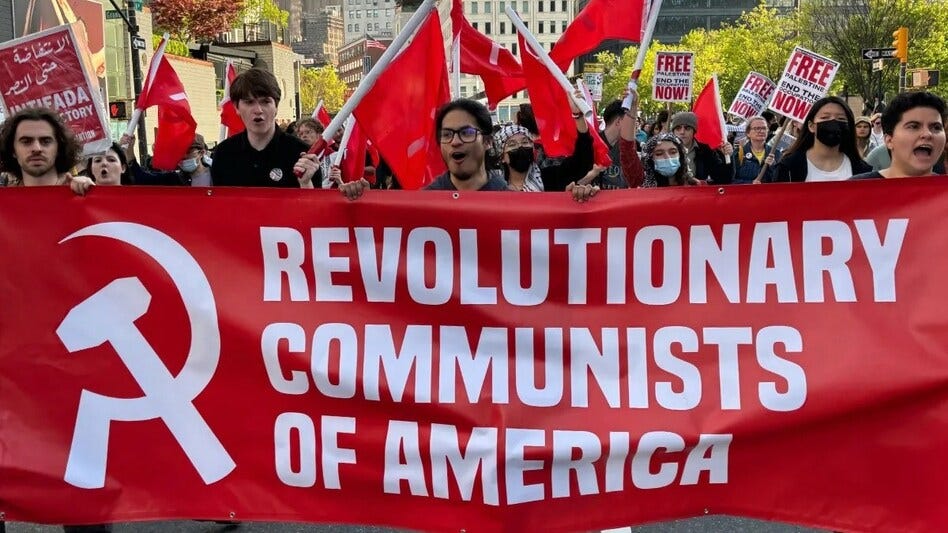The New American Leftist
Understanding the Rise and Radicalization on College Campuses
I would presume that for the average American, the word "Leftist" evokes the image of brutish, impassioned political activists who champion the writings of thinkers like Karl Marx or Vladimir Lenin and wish to bring about the destruction of capitalism to make way for a presumed future socialist paradise.
In this article, I will attempt to dissect a different type of leftist—one who indeed identifies with the label but is a far cry from the men and women who brought about the revolution in Russia or fought alongside militarists like Che Guevara in Cuba. No, the type of leftist I would like to explore is that of the modern American leftist, specifically those who inhabit liberal college campuses. As a student at one of these universities, I encounter these characters nearly every day, whether it be in class, at a campus protest (of which there seem to be endless), or simply when engaging with nearly any space on the internet, this new brand of leftism has seemed to grow ever more popular, or at the very least more visible, as of late.
Before I continue, I have a confession to make. I am not an outsider looking in upon these individuals. As recently as junior year of high school, I was one of the three co-founders of my school’s "leftist club," an organization aimed at legitimizing leftism as a political belief, educating others on what socialism was, and helping to distinguish the types of leftists—because anyone involved with any leftist political circle knows there are oh so many. I genuinely believe that my younger self came from a place of good intentions with this effort; I had begun to identify with socialist thinking after reading some of Marx's introductory works. While my interest in Communist literature was cut short by the inevitable stress of college admissions and the increasing time commitment of other activities post-COVID, one thing my brief foray into leftism did leave me with was an intimate understanding of the psychology of my like-minded contemporaries. I was, for a time, involved with many online left-wing groups, where I met many people and learned much about what it meant to them to be a "leftist."
The first thing I learned about leftists was that many of them liked to talk—a lot. There was never a peaceful moment among these people; every conversation inevitably decayed into bickering, debating, or flat-out arguing over some minute detail of leftist theory. Perhaps the most popular pastime of young, terminally online leftists like myself was watching influential streamers like Hasan Piker argue with guests, each other, or even their fans. As a slightly more mature person, I no longer conflate popularity with intelligence; however, I viewed these men as prophets at the time.
I had essentially aligned myself with the political views of my favorite leftist figurehead, whether or not I took the time to think them over myself. Herein lies the first problem with modern leftism: the stealthy subversion of critical thinking. Debates were not won or lost based on the points made or the logic utilized; they were won based on who in the debate could stand by their views long enough to make the other person lose their cool. In this way, it didn’t matter whether you were right or wrong; it mattered how confidently and charismatically you could recite your talking points—a skill I took into my actual time as a high school debater. Growth in belief was not the point of the leftist debate—winning was. Conceding anything was seen as a loss. This reductive thinking led many young leftists to fall into the inevitable “echo chamber” trap, in which the less confident and charismatic ones would only surround themselves with individuals whose beliefs identically reflected theirs. As this continued, many realized that to survive in this circle, one would constantly have to readjust their beliefs to whatever the common opinion was to stay relevant. Whether dictated by individuals like Hasanabi or more of a groupthink, young left-wingers would have to continue to shift further and further left to prevent ostracization from more hardcore leftists.
At this point, you’re probably thinking, “Who cares about being accepted by people you hardly know in niche online circles?” Well, people like me did. Most left-leaning youth joined these circles, in large part, because it’s easy. Making friends wasn’t always easy for me. Like many people, I was socially awkward, afraid to try new things, and had a somewhat negative self-image. Young people often make friends through music, hobbies, or sports—but these all require time, commitment, and some risk. Politics requires none and can be an avenue for much-craved social interaction. It costs very little time to identify yourself with a political movement or ideology, and there’s very little intrinsic talent or charisma involved in doing so, either. It seems like a perfect avenue to meet people, have something to talk about, and eventually be accepted as a “member of the group”—something insecure teenagers like me desperately wanted.
On the surface, left-wing ideology has many ideas that are very appealing to young minds—equality, fairness, acceptance—it’s not hard to understand why someone young and curious would choose to try to learn more about an ideology whose foundation outwardly relies upon these things. In turn, we become intimate with these groups, which, at the outset, are very accepting of new, curious individuals. However, as things progress, the aforementioned ideological squeeze begins to happen. For some, like me, this burden begins to be too much to bear, and a natural progression of social ability and self-confidence will lead to a swift exit from these social circles. For others, the idea that not continuing to radicalize their leftist beliefs will lead to ostracization and a collapse of all social standing within the group forces them to adapt and further entrench themselves within the leftist orthodoxy. They begin to spend more and more time online, being radicalized by their peers, idols, and Russian internet bots, continuing to stay in a comfortable and ‘acceptable’ position within the ideological hierarchy.
The central ideological tenets of modern radical leftists are roughly as follows:
All authority, especially that which supports or is supported by ‘the West,’ is bad.
Capitalism is intrinsically evil, and anything done within the system of capitalism is evil by nature.
Anyone not actively involved in the perpetuation of leftist beliefs is a tool of capitalism and is, therefore, evil.
I am unsure whether these beliefs are caused by parental issues or a general disdain for authority. However, the toxic and dangerous ‘in-group’/‘out-group’ dynamic should be apparent. Eventually, the young leftist will be backed so far into an ideological corner that it begins to affect their actual lives. Former friends must either conform to their beliefs or be cut off; interacting with institutions like school or work must be done in a manner that perpetuates the leftist agenda so as not to be a helpful tool of evil capitalism. Eventually, anyone who does not conform to the dogma must be thoroughly demonized and viewed as the enemy.
Then, they go to college.
Either due to cognitive dissonance or not being far enough down the ideological funnel for it to be entirely contrary to their leftist views, your modern young leftist (or, more likely, their parents) will most likely shell out upwards of $60,000 a year to attend the most prestigious university they can get into. College is different from high school; with far less structure in place and actual adult responsibilities to attend to, young leftists are forced to adapt. Luckily for them, their most significant enablers are often the universities themselves. Tell me—what is the only viable career path for someone who is somewhat well-read in politics and history, lacks social skills, and has a deep disdain for the concept of working and employment? That’s right, staying at school for as long as possible. Higher education has always been the cradle of the progressive movement, so it’s no wonder that most liberal universities have a large portion of faculty who are willing to enable leftist students to engage themselves in their radical political ideology fully.
Whether it’s graduate students outright teaching classes that align with leftist thought or school-sponsored clubs that perpetuate the social circle that leftism has become, the college campus is the perfect place for a young leftist to continue their journey as a warrior against the West. Here, physically surrounded by like-minded individuals, these young ideologues are emboldened to share their beliefs in the open instead of behind a computer screen. They congregate in places such as my university's “womb room,” which, founded as a place where transgender individuals could go to feel safe and get the resources they need, has become a breeding ground for radical anti-Western and anti-Semitic rhetoric. The picture below is just a snapshot of the ‘arts and crafts’ portion of the leftist social club. I do not believe for one second that the people who made these posters have considered the nuances of what would happen should the state of Israel fall under the rule of Hamas. It is clear to me that the only ‘reasoning’ that has taken place in their minds is attributing the fact that Israel is in power to some inherent evil on behalf of everyone who perpetuates its existence, which somehow justifies every person within that scope to be eradicated in the name of ‘justice.’
Speaking to these individuals, it has become clear that they no longer possess any of the characteristics of a genuine political movement because their ideology rests solely on the endless critique of power rather than specific policy positions. It doesn't matter who the Democratic nominee is or could be—they will always be instantly demonized for participating in the U.S. political system in the first place. Every single position that leftists take is simply an extension of their disdain for authority and craving to critique it. They have backed themselves so far into their orthodoxy that supporting the establishment at any level, including civic participation, would contradict their belief system. Not only is voting futile since every candidate is complicit in some intrinsically evil behavior, but the problems of every individual are seen as the fault of capitalism, the West, or White people (i.e., those perceived as having power). In this way, the leftists reach an equilibrium of misery, where they can endlessly whine and complain about the evils of others, abandon all personal agency, and fully engross themselves in the idea that the only morally correct thing to do is continue to advance the leftist agenda—which consists of continuing to whine and protest until the end of time.
This diagnosis of modern American leftism is the key to understanding the rise in popularity of seemingly radical views among young, left-leaning individuals. The sooner the average well-meaning, politically engaged person can understand that these left-wing stances are a symptom of a social phenomenon rather than a political one, the sooner we can engage these people with the seriousness they deserve. While disenchanted with the ‘left-wing pipeline’ and those who perpetuate it, I feel a measure of deep pity for those ensnared within its social funnel—because at their hearts, they are people like us, who want to have friends who wish to be accepted, and simply lack a positive outlet to direct their social angst and anxiety.





